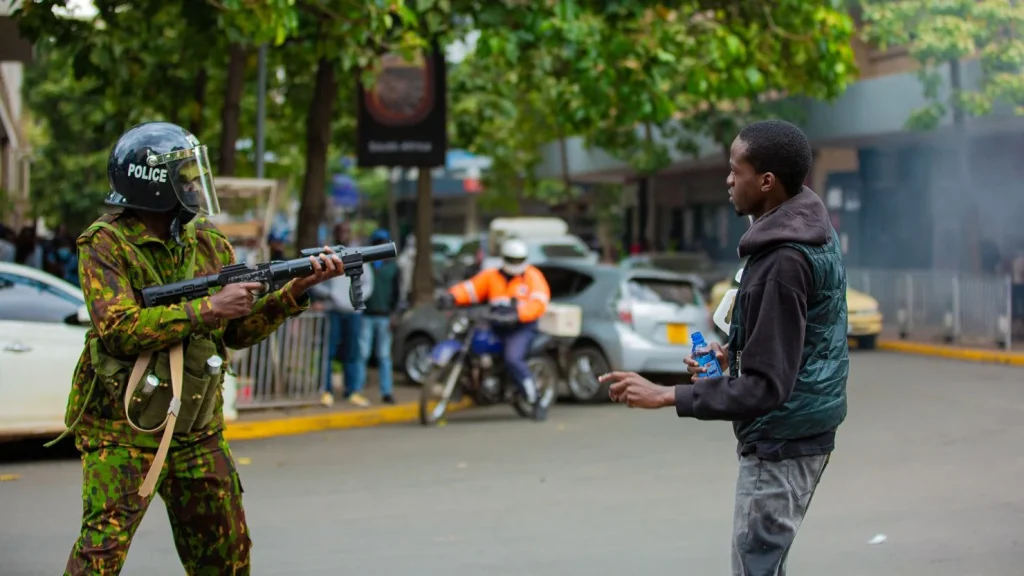The year 2023/2024 has seen a significant decline in democratic practices and increased civil and political instability across East Africa. While these challenges have been more visible in some countries, they have been more controlled or suppressed in others, such as Rwanda, the Democratic Republic of Congo (DRC), Tanzania, Kenya, and Uganda.
In the Republic of Rwanda, the Republic of Uganda, and the Democratic Republic of Congo (DRC), military personnel step out to defend the public good through military coup. Unfortunately, attempts were unsuccessful even before the execution.
In the Republic of Kenya and the United Republic of Tanzania, civil societies and civil associations break tribal, ethnic, religious, educational and economic status to stand firm against suffocating corruption and unrepresentative government.
The aftermath in Kenya is a tragedy to both government and citizens, while in Tanzania, only oppositional party members and human rights activists have experienced inhumane treatment from the government and unknown military personnel.
East African governments have discarded both military strategy and civil measures as unconditional and undemocratic, and therefore, state apparatuses have taken strict measures to counter disobedience.
READ RELATED: Will Military Coups Continue to Plague African Politics? We’re Far Away From the Real Democracy
For instance, military personnel in DRC charged with coup attempts were sentenced to the death penalty. The Republic of Rwanda military personnel suspected of preparing a coup were fired, and the same measures have been implemented in Uganda.
Unlike other East African countries, Kenya demonstrates some consolidated democracy, although the banning of demonstrations and protests against the 2024 finance bill was suppressed.
Police forces and military units experienced a shift of command from suppression to supervision due to the citizenry’s effort to hold the Ruto administration accountable. Kenyan citizens attracted the attention of regional and international organisations and agencies to intervene in the situation and defend the rights of protestors.
In Tanzania, the Government is suspected of applying informal and formal strategies to counter youth civil uprisings. Police forces have been associated with being involved both formally and informally under the auspices of “Kudumisha Amani”, disapproval and disclaimer of demonstrations called by Chama Cha Democrasia na Maendeleo (CHADEMA) in Dar es Salaam via the office of Regional Commissioner (RC) who gamely launched General cleanliness in the region that was supposed never to happen and IGP statement to deny 23rd September demonstration following abductions of vibrant oppositional party members across the country.
Lesson From Kenya
Economically, Kenya is a leading developing country in East Africa and is identified by IDEA as a democratic country. Semi-democracy Tanzania and authoritarian Uganda follow it.
Despite political differences, all African countries, except Botswana, Swaziland, and Lesotho, heavily depend on aid to fund their kleptocracy government and are not responsible to anyone in the local context. However, pretending to implement donors’ and development partners’ conditionalities puts the continent’s sovereignties in question.
Kenyan citizens are sensitive participants in their local politics. They implement economic policies and call for transparency in government funding.
Scandals and propaganda of politicians and artists that quickly sweep their attention away no longer hold a grip of their attention and social factors such as homosexuality were used by politicians to shift the attention of citizens from proponent oppositions and give the ruling class a symbol of protector of African virtues has goes weary.
ALSO READ Tanzanian Election Reforms Questioned: Will Future Elections Be Free and Fair?
Kenya has sacrificed about 50 people to ensure the citizenry’s voice is heard, 280+ injured and 230+ arrested, although the statistical data given is unconfirmed and controversial. Police brutality and all suppressive measures were deployed to ensure that the kleptocratic Kenyan government maintained its exploitative decree but in vain.
Parliamentary dependency and overshadowing by the executive organ were evident as the national assembly approved the deployment of military units to assist police forces in restoring peace and order. However, the blood and sweat of Kenyans turned their land from a dead valley into a fertile garden.
“Hakuna Mkate Mgumu Mbele Ya Chai”, finally, citizenry power received victory. It only remains for policymakers to adjust the recommended bill to fit people’s demands, analysts to discuss the events conceptually, academics to analyse the moment for educational purposes, and other groups of writers to enrich East African history of democracy and democratisation.
Democracy is backsliding, and action is needed to restore it. It’s not donors and international multilateral agencies but youths, civil society organisations, religious institutions and everyone to spearhead the restoration and consolidation of democracy in East Africa.
“Outbreak of democracy” needs no permission from state apparatuses and no identity or affiliation to a particular association; it requires the willingness to sacrifice oneself for the public good. Suppose Tanzania needs to protect its people from abduction, Soviet political parties, corruption, and kleptocracy.
In that case, it needs protests, demonstrations, activism, and civil resistance, which go beyond the traditional strategy of waiting for a five-year general election to hold political parties accountable instead of the government.

